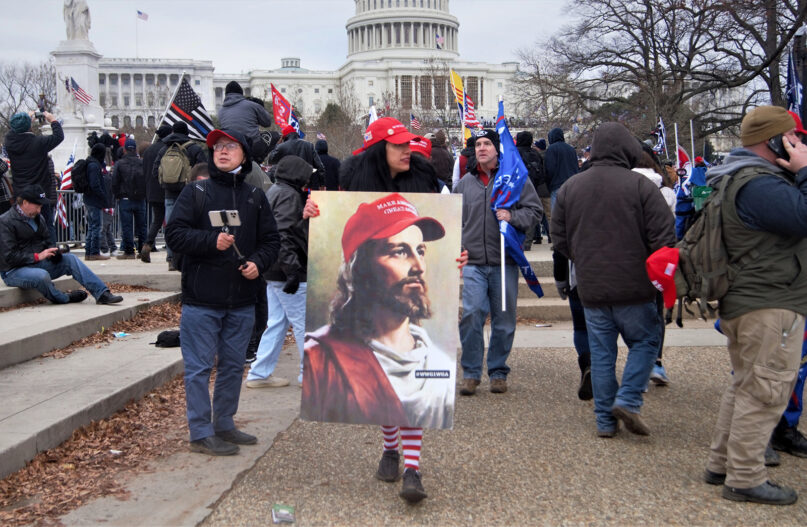Christian nationalism needs to be distinguished from civil religion
The latest PRRI survey shows it's a Black-white thing.

(RNS) — Ten percent of Americans are adherents of Christian nationalism, with another 19% in sympathy with its ideals, according to a new PRRI survey. These two groups are far more likely to hold racist, anti-immigrant and anti-Muslim views than the rest of the U.S. population. Among white evangelicals, 29% rate as adherents, with an additional 35% as sympathizers.
None of this is particularly surprising. Donald Trump cranked up God-and-country fervor, and no religious segment of the population has been more fervent than white evangelicals.
How did PRRI arrive at its numbers? The scoring is based on respondents’ degree of agreement with five statements:
- The U.S. government should declare America a Christian nation.
- U.S. laws should be based on Christian values.
- If the U.S. moves away from our Christian foundations, we will not have a country anymore.
- Being Christian is an important part of being truly American.
- God has called Christians to exercise dominion over all areas of American society.
If there’s a surprise in the survey, it is that fully 20% of Black Protestants who identify as born-again or evangelical agreed sufficiently to count as adherents. Overall, 38% of Black Protestants scored at the adherent or sympathizer level.
During a panel discussion on the survey at the Brookings Institution last week, historian Jemar Tisby, the author of “The Color of Compromise” and “How to Fight Racism,” said he thought the survey language resonated with so many Black Americans because of their high degree of Protestant Christian religiosity. But, he contended, this did not make them Christian nationalists.
“I contrast white Christian nationalism with Black Christian Patriotism,” Tisby said. “When you talk about white Christian Nationalism, it tends toward a rigid, narrow, authoritarian kind of politics. When you’re talking about Black Christian Patriotism it tends toward an expansive, flexible, inclusive kind of politics. And so it’s not just the words people use, it’s the ramifications of what they mean by those words.”
While I’m reluctant to cut Black Protestants quite so much slack, it is important to recognize that the same religious language can be — and over the years has been — put to contradictory political purposes in the way Tisby suggests.
In the 1930s, “Christian,” long employed as an umbrella characterization of American society, was appropriated by America First nationalists to signal that no Jews need apply. Antisemitic radio preacher the Rev. Charles Coughlin, a Catholic priest, prompted the creation of an organization called the Christian Front; other such organizations included the Christian American Crusade, the Christian Mobilizers and the Christian Party.
In response, liberals began using “Judeo-Christian” to rename the religious tradition that all Americans were presumed to share and that was supposed to undergird the struggle against fascism and, later, communism. But then, in the 1980s, “Judeo-Christian” was seized upon by the religious right as a rhetorical cudgel in its political war against secularism and the values of “the ’60s.”
In its inclusivist heyday, Judeo-Christian language served what Italian scholar of totalitarianism Emilio Gentile defines as “civil religion”: the “sacralization of a political system” that guarantees “a plurality of ideas, free competition in the exercise of power, and the ability of the governed to dismiss their governments through peaceful and constitutional methods.”
In the hands of the religious right, “Judeo-Christian” has served what Gentile calls “political religion”: an “intolerant, invasive, and fundamentalist” faith employed as a weapon in partisan combat.
Civil religion still lives on, however. It’s represented in a resolution condemning white nationalism that the Democratic National Committee passed earlier this month, harking back to the “Judeo-Christian” version that took shape during World War II. It’s there in Tisby’s concept of Black Christian Patriotism, which resembles the civil religion of America before the rise of fascism.
The “Christian” political religion of the 1930s lives on as well, in the form of today’s white Christian nationalism.
No comments:
Post a Comment